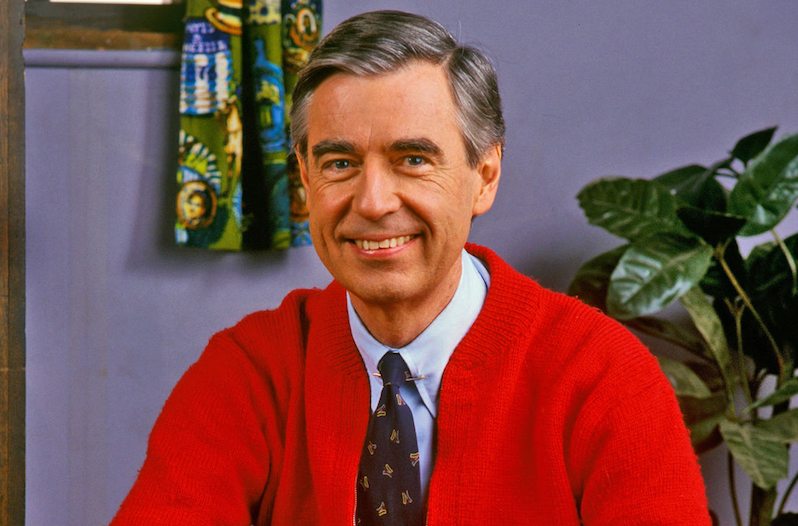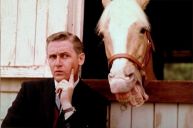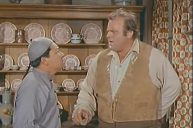We all knew his routine by heart. He'd swing open the door, give a smile and a wave, remove his suit jacket and throw on one of his many cardigans. Then, with an unspoken gesture to us to make ourselves at home, he'd sit, remove his dress shoes and put on a pair of Keds. For over 30 years, Mister Rogers provided a sense of comfort and stability to millions of kids. Though he would visit the Neighborhood of Make Believe, which implied otherworldly happenings, it was Mister Rogers' kindness, calming presence and daily routine that kept his faithful neighbors tuning in.
It's that lasting devotion that will be explored in the upcoming documentary film Won't You Be My Neighbor?, which will focus on the legacy of Mister Rogers. The documentary will also give an intimate look at the man who molded the minds of a generation as producer and beloved host of the iconic show.
"The Fred Rogers I discovered making this film is at once comfortably familiar and completely surprising," director Morgan Neville said in a statement. "I believe Mister Rogers is the kind of voice we need to hear right now."
And there's good reason to believe that. Though he's been gone for almost 15 years now, the goodness of Mister Rogers lives on. We still turn to him in times of crisis, remembering his advice to "look for the helpers" during tragic events. ("When I was a boy and I would see scary things in the news, my mother would say to me, 'Look for the helpers. You will always find people who are helping,'" Rogers once said.)
Stories of his kindness continue to permeate the web. His cardigan is in the Smithsonian Institution. So who was this man in the cardigan and Keds, and why has he had such a lasting impact on us?
Forever a Neighbor
Fred McFeely Rogers was born in 1928 in Latrobe, Pa. He was a creative kid who loved piano and music composition. Educated as a Presbyterian minister at the Pittsburgh Theological Seminary, Rogers soon became interested in television. He wanted to change the content that was shown to children.
He got his start on musical programs, such as The Kate Smith Hour and The Voice of Firestone. After a brief time with NBC, Rogers' first public television gig was as a puppeteer on The Children's Corner on Pittsburgh public television channel, WQED.
Mister Rogers' Neighborhood debuted in 1968 and moved to PBS the following year. Having studied childhood development, Rogers was unhappy with the cloying, hyperactive nature of most children's television shows. In stark contrast, Mister Rogers was always calm, talking to children — his neighbors — as equals.
https://www.youtube.com/watch?v=4AtLIJjEbh4
He taught us how to deal with anger, be truthful, express feelings and be creative. Visiting Brockett's Bakery, Bob Trow's Workshop, and Negri's Music Shop, he taught us to be curious about the world around us.
He introduced us to Henrietta Pussycat, Daniel Striped Tiger, King Friday XIII and Lady Elaine Fairchilde. And he taught us the simple beauty of a good feeling.
Rogers always wanted to make sure children felt safe and didn't shy away from addressing difficult subjects. After John Lennon was shot, Rogers produced a special episode called Mister Rogers Talks to Children and Adults About Violence.
He proudly wore cardigans personally knitted by his mother. Rogers also always made a point to mention out loud when he was feeding his fish because he had received a letter from a blind girl who was upset that she couldn't tell if the fish were being fed.
Through seemingly small acts, Mister Rogers showed that all of us could change lives just by being kind.
In 1992, Rogers won a Peabody Award for his decades of service in children's educational television.
At the 1997 Daytime Emmy awards, Rogers was presented with the Lifetime Achievement Award. In classic Mister Rogers fashion, he made the moment about all of us.
https://www.youtube.com/watch?v=ZGHKAWdmGvI
Rogers was inducted into the Television Hall of Fame in 1999. In 2002, he was given the Presidential Medal of Freedom by President George W. Bush.
Just a few months before his death in 2003, Rogers recorded a final farewell to the faithful friends who'd grown up watching him.
When he died on Feb. 27, 2003, letters from Rogers' widespread world of neighbors flooded in. Winter Park, Florida, home of Rogers' alma mater, Rollins College, named March 29 "By My Neighbor Day" in honor of Mr. Rogers.
The Fred Rogers Company, of which Rogers' wife Joanne is Chair Emerita, continues to produce programs for the Public Broadcasting Service.
Fred Rogers may be gone, but his neighborhood — and all of us who grew up in it — can carry on the legacy of Mister Rogers. After all, he likes us just the way we are.
For more information on Won't You Be My Neighbor?, click here.




